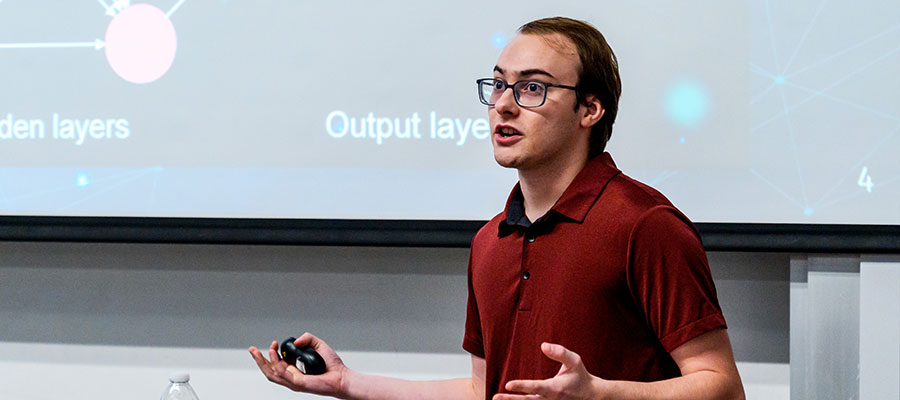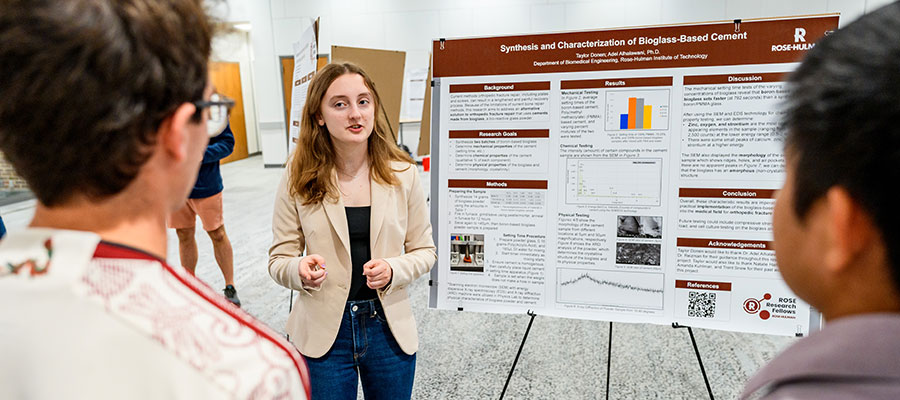Curriculum Pathways to Research

Research is a core component of the CSSE experience and culminates in the senior research experience. A student who completes a research experience in the CSSE department will be able to:
- Acquire knowledge from a variety of types of sources (primary, secondary, tertiary, etc.)
- Identify an appropriately scoped problem or question for research.
- Collaborate with other researchers on a scientific problem.
- Become adept at gathering peer-reviewed literature relevant to their question.
- Synthesize literature to explain how it is relevant to their question.
- Creatively design experiments to answer specific aspects of research questions.
- Work independently to create a research plan that will answer their question.
- Implement their planned approach and adapt it as necessary.
- Explain what was already known about a problem before their project.
- Write a document that clearly describes the problem, approach taken, and results.
- Create visualizations or figures to help communicate key results from the research.
- Perform statistical analyses to make defensible conclusions about results.
- Recognize that creating, modifying, misrepresenting or misreporting data including omission or elimination of data/findings is unethical.
- Verify that sources are relevant and properly attributed.
- Orally present their work to a non-domain expert scientific audience.
Rose Research Fellows
First- and second-year students also have the opportunity to participate in the Rose Research Fellows program. This select, small cohort of students conduct meaningful research to address a problem they care about while making connections with Rose-Hulman faculty and peer students on campus. Students also enroll in courses that introduce the process of research and provide skills for success in the laboratory.

Curriculum Path to Research
Through the curriculum, CSSE students develop an understanding of their own personal workflow and how to leverage it in independent work through group/term projects. They also gain an ability to give a focused presentation on a topic. The following core required courses in the CSSE curriculum are taken by all majors and include a research component.
CSSE220 (specific to research project alternative to the Arcade Game project)
- Differentiate a testable hypothesis from a prediction.
- Understands the basic scientific process, including planning, performing, and reporting experiments.
- Experience with writing concise scientific documents (e.g. an abstract, summary of a paper).
- Familiarity with reading and interpreting common kinds of scientific graphs and figures.
- Reviewing work of others critically and professionally.
- The ability to search through databases of peer-reviewed literature.
- Ability to identify patterns and themes from a collection of documents/work.
- Differentiate a testable hypothesis from a prediction.
- Differentiate a testable hypothesis from a prediction.
- Understands the basic scientific process, including planning, performing, and reporting experiments.
- Experience with writing concise scientific documents (e.g. an abstract, summary of a paper).
- An understanding of their own personal workflow and how to leverage it in independent work.
- An understanding of their own personal workflow and how to leverage it in independent work.
- Reviewing work of others critically and professionally.
- Reviewing work of others critically and professionally.
- Reviewing work of others critically and professionally.
The following upper-level CSSE electives, which are selected based on the student’s emphasis, also contain a research component.
- Students attain many research skills: reading papers, reproducing results, designing and implementing an experiment, reporting on and visualizing results, creating a project proposal.
- Students conduct weekly readings of current research articles and discussions, designing a final research or applied project, learning to write a mini research paper with overleaf. They present research or projects in class. Students are provided peer review opportunities, and conference venues with industry experts invited to present their current research.
- Experience with writing concise scientific documents (e.g. an abstract, summary of a paper).
- The student can distinguish kinds of concepts contained in the major parts of a research paper.
- Similar to the Distributed Systems course, students receive a list of networking conferences. They read papers and write a report (specifications for the report is described in the explanation for the previous course) for incentive points. Students need 100 incentive points in the quarter, but any more than 100 starts counting as extra credit.
- Students read and provide a summary of a couple of papers related to establishing consistency in distributed environments.
- The ability to search through databases of peer-reviewed literature.
- Experience with writing concise scientific documents (e.g. an abstract, summary of a paper).
- The ability to give a focused presentation on a topic.
- This course offers many opportunities to design algorithms and extensive practice in analysis, both of which are skills that contribute to research. Students are required to write proofs (usually of algorithm correctness), which are a central skill in the research of CS theory.
- Students research an extra topic of interest in crypto, write a paper and make a presentation about the topic. Depending on the topic, it may include reading research papers. Students peer-review other presentations.
- Students develop a lit review of the state of the art in the area of machine learning they have chosen to work on for their term project. They submit summaries, relevance and a critique of one paper per team member. They then rework it and further summarize in a related work section of their final project report.
- Students are given a list of conferences in the area of Distributed Systems from which they may choose. They are required to write a report on three separate papers from any of the stated conferences. They are asked to summarize the paper and explain its relevance and/or importance to the area of Distributed Systems and what it truly accomplished, if anything, and its implications for the future.
- Students are also given the opportunity to write more papers with the same requirements for “incentive points,” which is a way students can earn further credit (they must get 100 points in the term, but any more in the class starts counting as bonus credit). For incentive points, students can write a report on a research paper, present one to the class, or present some new technology, framework, technique, etc.
- Students develop a hypothesis of the impact of a software system and then analyze that system to substantiate (or not) that hypothesis. Skills gained include analysis, literature search and authoring a paper.